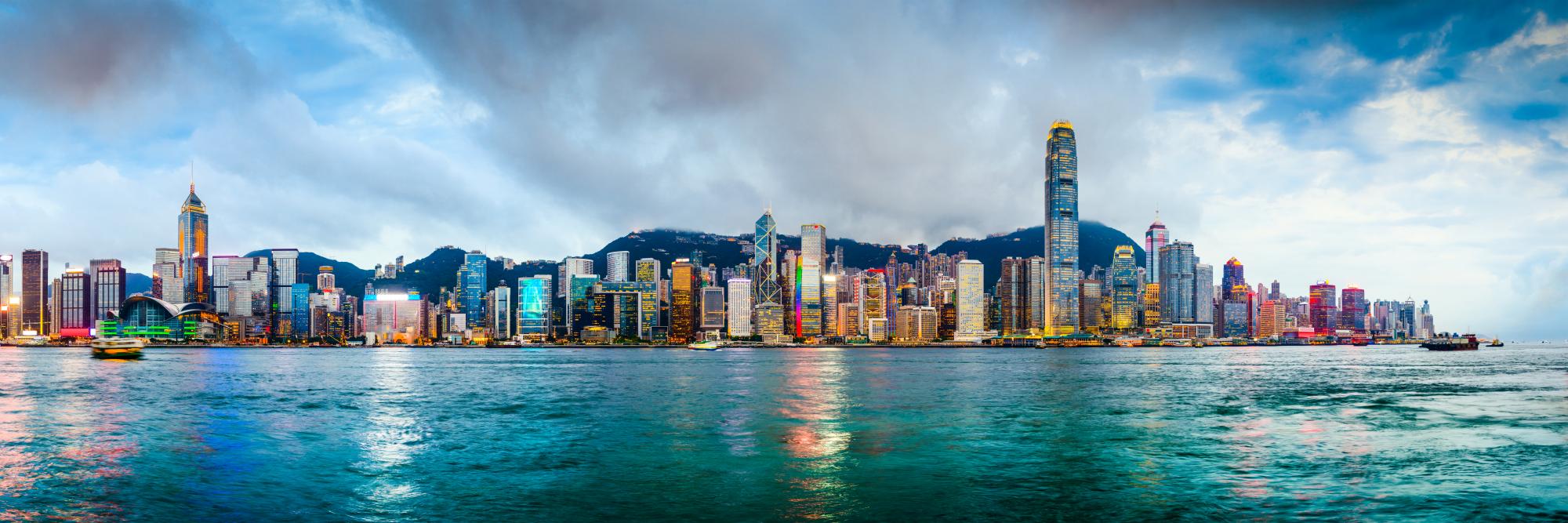 Kate McDonnell is an Australian expat who has been living in Hong Kong since 2011.
Kate McDonnell is an Australian expat who has been living in Hong Kong since 2011.
After following her husband to the Special Administrative Region, she got used to the lack of quality produce and small living spaces, coming to embrace the city's safety and bustling social scene.
She tells us about high rentals, the constant buzz of the streets, the city's strange preference for cheques and the cable car to the Big Buddha.
About Kate
Q: Where are you originally from?
A: Perth, Australia. (Grew up in Sydney)
Q: Where do you live now?
A: Hong Kong, Discovery bay (on a big houseboat in the Marina!)
Q: When did you move to Hong Kong?
A: February 2011
Q: Did you move here alone or with family?
A: With my husband.
Q: Why did you move to Hong Kong?
A: My husband’s work in avionics for business and private jets.
Living in Hong Kong
Q: What do you enjoy most about Hong Kong? How would you rate the quality of life compared to Australia?
A: I most enjoy how the city never sleeps, and how friends can be made anywhere.
Q: Any negatives? What do you miss most about Australia?
A: The quality of fresh produce is not up to home standards, unless you know where to find it. Also, banking is oddly antiquated for a financial world leader: they still favour cheques over internet transfers!
Q: What are the biggest adjustments you had to make when settling into expat life in Hong Kong?
A: The constant noise and amount of people is a lot to take in, but I love the vibrancy it gives the city.
Q: What’s the cost of living compared to home? What is cheap or expensive in particular?
A: Rent is far more expensive, but other things like eating out, transport and electricity bills are far cheaper. I think it balances out.
Q: How would you rate the public transport in Hong Kong? Do you need to own a car?
A: Unless is you live in the New Territories you don’t need a car. Trains are spotlessly clean, fast and there’s one every few minutes. Trams and the Star Ferry (that goes back and forth from one side of the harbour to the other) are so cheap it’s a wonder they can keep them running. Taxis are very cheap and plentiful, as are buses and minibuses. Larger ferries can take you to other places, such as Discovery Bay and Mui Wo.
You can even take a day trip to Macau by ferry, hydrofoil or helicopter, just don’t forget your passport. As if all that’s not enough, we also have a cable car that takes you from Tung Chung to the Big Buddha!
Q: How would you rate the healthcare in Hong Kong?
A: The healthcare, both private and public, is of a good standard, and most practitioners have gone to medical school in countries like Australia or the U.K.
Q: What are the biggest safety issues facing expats living in Hong Kong?
A: Hong Kong is a very safe city. As a woman, I can walk alone or get public transport very late at night by myself and feel completely at ease and safe – which is especially great for single ladies or those with partners who often travel for business.
Q: How do you rate the standard of housing in Hong Kong?
A: Rent is very expensive here, and if you want to go cheaper or closer to what you would pay back home you won’t get a very good standard. Also, be prepared for living in a much smaller place.
Q: Any areas in Hong Kong you’d recommend for expats to live in?
A: People’s taste’s and budget differ and the areas in Hong Kong are all very different to each other. Many expats live on HK Island – Mid-Levels, Wan Chai, Happy Valley, Shung Wan. There are areas on Kowloon side, like Elements, that are also popular.
Discovery Bay is really great for those with young kids, though it tends to be more like a very nice Western suburb and rather insular. Tung Chung is popular with a lot of aviation employees from Cathay Pacific or Dragon Air due to its airport proximity. Sai Kung and Mui Wo, although not very central, are also popular.
The Peak, Deepwater Bay, Repulse Bay and Stanley are great for the very affluent, many of whom drive luxury cars.
Meeting people and making friends in Hong Kong
Q: How tolerant are the locals of foreigners? Is there any obvious discrimination against particular groups?
A: The locals are fine with Westerners; oddly, it’s the mainland Chinese they really can’t tolerate. Many Westerners also end up with this anti-mainlander attitude, which is disappointing.
Q: Was it easy meeting people and making friends? How did you go about meeting new people?
A: Very easy. This city is full of expats who have been in your shoes, so they are very welcoming and always happy to swap contact details or give you a business card to get together again. You can make friends just about anywhere – just get out there!
Q: Have you made friends with locals or do you mix mainly with other expats? What advice would you give to new expats looking to make friends? Any expat groups you can recommend?
A: Hong Kong has an abundance of social clubs and expat forums to join activities like wine nights, sporting groups, book clubs…you name it. Making local friends is not as easy as I thought it would be, and I have yet to figure out why. Both sides are more than happy to mingle when it comes to socialising at parties, but forging real friendships is harder. It’s a real shame.
About working in Hong Kong
Q: Did you have a problem getting a visa or work permit?
A: My husband’s employer sorted all that out for us.
Q: What’s the economic climate like in the city? Do you have any tips for expats looking to find a job in Hong Kong?
A: Hong Kong had a downturn like everyone else, but it was far less detrimental and bounced back quicker than almost any other financial city in the world. LinkedIn is popular here, but according to my own research produces few actual results. Employment is mostly done through word of mouth or knowing someone in the company, so get out there and start meeting people!
Q: How does the work culture differ from home? Do you have any tips for expats doing business in Hong Kong?
A: People work far longer hours than at home. No one leaves the office at 5.30pm! Working on a Saturday is not uncommon. However, they balance it out much better with a heavy dose of socializing – far more than at home. Bars and restaurants are still buzzing late on a Tuesday or Wednesday night.
Family in Hong Kong
Q: Did your spouse or partner have problems adjusting to Hong Kong? Do you think there are any specific challenges for a trailing spouse?
A: My partner and I settled in well, but I have friends for whom that wasn’t the case. Many trailing spouses struggle the most initially and feel a sense of loss, especially if they strongly identified with their job or career back home.
And finally…
Q: Is there any other advice you would like to offer new expat arrivals?
A: Find your niche. Hong Kong is a unique, multifaceted city. When you arrive, try to get around and see as much of it as you possibly can, as every area has its own unique vibe and there’s a place for everyone. You can’t judge the whole of Hong Kong on the one area you’ve stumbled into.
Explore with gusto, say yes to anything that comes your way, avoid comparisons with “home” and remember that, like most things in life, you only get out what you put in.
►Interviewed in November 2014



